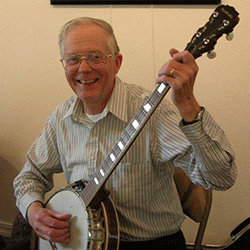
Carl Rovainen, PhD, professor emeritus of cell biology and physiology, died of cancer Friday, March 1, 2013, in Brookings, Ore. Rovainen retired from Washington University School of Medicine in St. Louis in 2001, after 34 years as a faculty member.
“Carl Rovainen was a unique faculty member and a wonderful human being,” said Phil Stahl, PhD, former head of cell biology and physiology. “He had many interests in addition to science, including music, wood carving and drawing.”
Rovainen earned a bachelor’s degree at the California Institute of Technology in 1962 and a doctorate in physiology at Harvard University in 1967.
He came to Washington University in 1967 as a postdoctoral fellow in the Department of Pharmacology. In 1979, he became a professor in the Department of Physiology and Biophysics.
Rovainen studied the development and function of the nervous system, using a model he developed in the eel-like species known as the sea lamprey. Later, he collaborated for more than a decade with Thomas Woolsey, MD, the George H. and Ethel R. Bishop Scholar in Neuroscience in Neurological Surgery. According to Woolsey, Rovainen’s pioneering work has been cited regularly since the early 1970s.
“Dr. Rovainen was one of the best colleagues I’ve ever had,” Woolsey said. “We developed some important insights into how brain activity affects local blood flow.”
Rovainen taught himself to play piano, banjo, guitar, mandolin, violin and other instruments. He and other faculty and staff members formed a musical group at Washington University that they called Taum Sauk, after Missouri’s highest mountain. They played songs from a range of genres, including folk, country and western, bluegrass and show tunes at parties and events.
“Carl was so friendly, humble and exuberant that everyone just had fun around him,” remembers fellow Taum Sauk member William Thomas Thach Jr, MD, professor emeritus of anatomy and neurobiology, neurology and physical therapy. “I don’t think he ever had an enemy in the world.”
According to Stahl, Rovainen, who grew up in Minnesota, kept ice skates in his office at the height of the Vietnam War. When “duck-and-cover” bombing drills would occasionally sound, Rovainen and the friends he invited would go to the Steinberg Skating Rink in Forest Park and skate the newly deserted rink.
At the end of each year, Rovainen would draw a picture of what he and his family had done that year and then send it to his friends as a holiday greeting.
“He never had a sad day,” said Diana Owyoung, a research administrator who has fond memories of going stone hunting with her husband and Rovainen. “Carl always delighted in life.”
After retirement, Rovainen moved to Brookings, a small Oregon community near the California border. He continued to play music and became active in community theater.
“Carl embraced life with enthusiasm and encouraged countless friends and acquaintances to do likewise,” said his wife of 46 years, Leslie Rovainen.
Rovainen is survived by his wife; his sons, Toivo, Ahti and Torsti Rovainen; and his sisters, Carol Brueske and Virginia Rovainen. At Rovainen’s request, no memorial service was held. Memorial donations may be made to a charity of the donor’s choice.